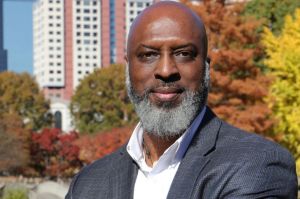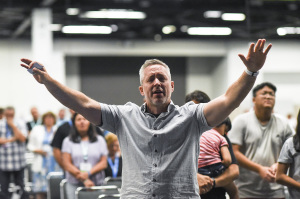Evangelical Pastor Calls Christ a Generalist, Not a Specialist
What is my calling? What is God calling me to do?
Often asked among the youth and increasingly among adults today, one author sums up the answer in three words – come and die.
“That’s the Bible’s idea of calling – developing each of the areas of our life and laying them down as to God on the altar of the world sanctified by the blood of Christ,” said author and pastor Eric Foley.
Debunking common misconceptions of the Christian journey, Foley tells believers in his new book The Whole Life Offering that Christians are called to be generalists, not specialists.
“Biblically, specialized callings are never to preclude general growth to fullness in Christ,” stated Foley to The Christian Post. “Christians are called to ‘in all things grow up into him who is the head’ (Ephesians 4:15).”
Many Christians today, however, feel the call to only participate or invest in works that they were most passionate about or interested in, neglecting other aspects of service and leaving it to others to balance.
“Calling is always a matter of dying to oneself, with all of its passions and preferences, and living unto Christ in each nook and cranny of outward service and inward spiritual development.”
“It’s not about discerning a particular career path to take or what ministry project to sign up for,” expressed Foley to CP. “Biblically, the idea is that over time the Holy Spirit is going to guide us through all the different areas of service and growth so that the world can see God regardless of what career we’re in.”
Illustrating that the Gospels did not portray Jesus administering “a gifts test” to his disciples and dividing up the labor according to what they were gifted at, Foley described how Jesus trained his disciples to do all that he did – healing, proclaiming, sharing bread, opening their homes, throwing banquets, and so on.
“And these weren’t preliminary activities designed to help them discover one or two ways to focus on serving him,” the pastor pointed out. “Doing all those various activities, grounded in the inward spiritual disciplines like prayer, Scripture study, worship, and doing it on an ongoing basis, that’s how Jesus portrayed the normal Christian life.”
“Christ himself was a generalist, not a specialist.”
Foley believes that Christians today seem to reflect only part of what they see in the Bible. They portray to the world a “house-of-mirrors-Christ, grotesquely distorted.”
“The distortion is not overcome when Christian specialists clump together like doctors in a practice. Clumps do not produce an accurate portrait of Christ so much as they produce a confusing array of distorted mirrors, with an aspect of Christ’s whole life offering exaggerated in each one.”
“Our passion and focus needs to be on experiencing the fullness of Christ’s love for us and for mirroring the fullness of Christ to all we meet, not for discovering what we do well,” noted Foley.
“Otherwise, what we’re presenting to folks is our passion, not our Christ.”
Sharing about how he came to understand this concept of a fragmented Christ, Foley told CP that the idea occurred to him while he was serving as an associate pastor at a large church over 20 years ago. One of his responsibilities was overseeing the youth.
While working with the kids, he noticed two kinds of groups emerge from among them.
One group loved Christian music, Bible studies, Christian t-shirts and talking about their faith, but was wary of putting their faith into action in the world. The other group was all about service projects down to the rescue mission and doing home construction, but Bible study and worship just left them uncomfortable or disinterested.
Both groups displayed a fragmented love and only embodied part of Christ, rather than bearing the full image.
Seeing these two distinct groups grow into adult Christians who were the same way, Foley knew this was a problem he had to address.
“At first I thought, ‘Well, maybe different people are just wired differently,’ but the more I studied the subject in the Bible I found there was no grounds for that kind of dichotomy.”
“Instead, I saw Jesus’ words in Matthew 7:24: ‘Everyone then who hears these words of mine and does them will be like a wise man who built his house on the rock.’ Hear and do!” the pastor explained.
“I came to see how those who hear the Word but don’t do the Word lack impact, while those who do the Word without having hearing it lack power. And my focus – not calling – has been to help Christians unite the hearing and doing of the Word.”
Foley’s new book seeks to help believers embody a comprehensive Christ, “uniting the hearing of the Word – or the internal spiritual disciplines by which believers come to know God, with the doing of the Word – or the ways believers mirror God’s love to the world.”
Christians sometimes cite Apostle Paul’s analogy of the body in 1 Corinthians 12 as justification for focusing on one or two areas of service while neglecting the remainder, Foley revealed.
“They think of themselves as an eye and not a foot – a minister to the homeless but not a proclaimer of the Gospel, for example – and assume that Christ somehow mystically stitches all of the disjointed pieces into a gorgeous physique.”
He explained, “Even a single eye contains the DNA necessary and sufficient to reproduce not only the foot but the whole of the body as well.”
“Ministry ‘specialists’ who are unable to reproduce the whole of Christ’s body are cancer cells,” Foley asserted, “fostering unhealthy growth and distortion in the proper functioning of the body.”
But how can Christians participate in every single work Scripture called them to? Is it even possible? By the early church model, the author assured it was possible.
“[Unfortunately], certain functions that the church and ordinary Christians used to do are now outsourced to Christian nonprofits. It’s as if we say, ‘Don’t try this at home! Leave it to the paid professionals!’” Foley lamented.
“And the result is that we only participate in the works we like and understand, and we get stuck in our immaturity rather than growing to fullness in Christ by the power of the Holy Spirit.”
Emphasizing to pass on to others, whatever was given by God, Foley urged Christians to become fully mature in every way just as Christ himself was, and be an unaltered reflection of the love of God.
Anything less could not legitimately be considered “Christ-likeness,” he declared.
“When we fail to mirror into the world the fullness of what God has given us, the image of God that we reflect into the world is a distorted one. Whatever it looks like, it isn’t the same love that was shown to us.”
Hoping to help Christians represent all of Christ, The Whole Life Offering lays out a one-year plan for growing closer to fullness in Christ by growing in love for God and love for one’s neighbor.
At the end of the day, Foley believes that Christians will find that becoming like Christ is not so mystical after all.
“It’s about connecting power and impact in Christ, which are two characteristics that unfortunately are quite separate today.”
The Whole Life Offering releases this month (www.thewholelifeoffering.com).
Eric Foley is the co-founder and chief executive officer of Seoul USA and serves as the pastor of DOTW, Doers Of The Word, a congregation of The Evangelical Church of North America that meets simultaneously in Colorado Springs, Colorado and Seoul, Korea.





























